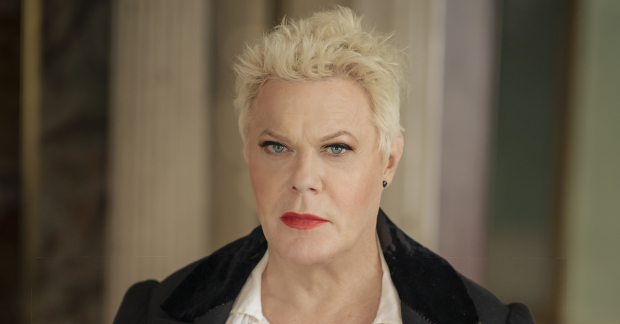Interview: How an Audio Book Led Eddie Izzard to Her One Trans-Woman Great Expectations
Izzard returns to the stage in this new solo show at the Greenwich House Theater.
In a refreshing break from all the Christmas Carols that come around during this festive holiday season, actor and comedian Eddie Izzard is thinking outside the box with her new off-Broadway show. At the Greenwich House Theatre on Barrow Street, Izzard is making a rare New York stage appearance, playing all the characters in a solo edition of a different Dickens classic, Great Expectations. Here, Izzard tells us how it came to be, and what we can expect.

(image provided by Boneau/Bryan-Brown)
This conversation has been condensed and edited for clarity.
How did you settle on Great Expectations?
I’m severely dyslexic and I realized that I had never, ever read a great work of literature. I am exactly 150 years younger than Dickens to the day, which doesn’t mean anything, but I thought, “Let’s run with this.” I kind of liked his story. There was something romantic about it. There’s also something kind of American dream about it, too. He had a lower-middle-class life, it wasn’t quite totally impoverished, but his dad got into debt and was in prison, which is what Little Dorrit is based on, and then he made it all the way up.
Anyway, I hadn’t read a work of literature. But audio books were on the rise. So in my weird little brain, I said, “Why don’t I get a company to pay me to read a book?” It’s quite nice to be paid to read a book, but it also ensures that you read the book. Because they say, “Well, you’ve signed a contract, so you have to do this.” Three weeks in the recording studio, over 20 hours of book, and Great Expectations read by me is out there.
In the recording studio, I thought that we could put it onstage. I could use the technique that Richard Pryor uses, where he would have characters talking to each other, which is what I adapted into my own standup, thinking that most standups did this, but actually most don’t. I said to my older brother, Mark, that we should adapt it together. He ended up doing the whole thing, because I was touring in America. We put it on its feet, cut it down to about two hours, and I’m playing about 19 characters. Certain characters are gone completely. The Pocket family is gone, because they were a crazy bunch of people. Dolge Orlick has gone and waddled away. He’s a very hateful character.
Of all the characters you’re playing, do you have a favorite?
It’s interesting as a trans-woman, doing a one-woman show. A one trans-woman show. And I’m gender-fluid, so I access the boy in me to play Pip and Joe and Magwitch, and I access the girl in me to play Havisham and Estella, and I find that fascinating. Estella is intriguing to play. She’s such an ice queen and so heartless. And through the years, there are a lot of women of whom I thought, “You are so beautiful, you’re not gonna be interested in me,” just like Pip was feeling. Herbert is fun to do especially in the early scenes because he’s just kind of bonkers. Jaggers is great to do. And Wemmick. Wemmick and Herbert have a lot of attitudes in them and they’re a little bit off-kilter. Jaggers is like a brick wall. And Havisham…I’m getting better at Havisham. I think it’s trying to distinguish between her and Estella. They felt a little bit close.
What is it like to do Dickens in New York City over Christmas?
I love New York. It’s one of my home cities. I don’t feel like this is an away city; this is a home gig. Dickens played here in the Steinway Hall — it was the Steinway company, and not only did they have pianos, but they had a 2,000-seat hall. So, he played here, doing Dickens, and I’m here doing Dickens, years apart. And I think he would’ve been OK with a trans-woman playing all the characters. I think he would’ve gone with that.










